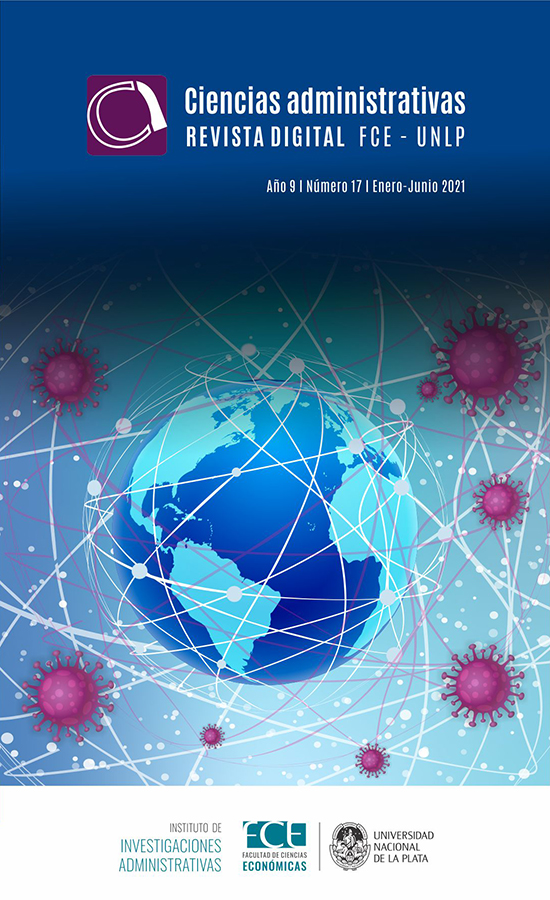Gestión del conocimiento y la agenda 2030 para el desarrollo sostenible en el contexto de la Organización de Naciones Unidas
DOI:
https://doi.org/10.24215/23143738e077Palabras clave:
agenda 2030 para el desarrollo sostenible, gestión del conocimiento, Organización de Naciones UnidasResumen
La Organización de Naciones Unidas constituye el marco global para la mayor parte de las actividades internacionales de nuestro planeta y cada vez más está expuesta a mayores retos que implican una demanda creciente de conocimientos para cumplir con su misión. Es por ello que este trabajo presenta, desde una perspectiva analítica, algunas reflexiones acerca del estado de la gestión del conocimiento en esta organización y su impacto en el cumplimiento de la Agenda 2030 para el Desarrollo Sostenible, posiblemente el mayor desafío en términos de conocimientos que ha enfrentado la Organización de Naciones Unidas desde su fundación. La importancia de este estudio radica en el hecho de que explora y aporta información sobre una temática que ha sido poco estudiada y su principal conclusión es que, aunque en la institución se han logrado avances en este campo, los resultados aún no alcanzan los niveles esperados debido principalmente a la ausencia de una estrategia común e integrada para la gestión del conocimiento.
Descargas
Referencias
Boyes, B. (2017). Improving knowledge management in the United Nations System. https://realkm.com/2017/11/10/improving-knowledge-management-in-the-united-nations-system/
Dimitriu, P. (2016). Knowledge Management in the United Nations System. Joint Inspection Unit, United Nations. https://www.unjiu.org/sites/www.unjiu.org/files/jiu_document_files/products/en/reports-notes/JIU%20Products/JIU_REP_2016_10_English.pdf
Franklin, E. B. (1997). Organización de Empresas. McGraw-Hill.
Glovinsky, S. (2017). How Knowledge Management Could Transform the UN. Development System. Future United Nations Development System. Briefing 45. https://futureun.org/media/archive1/briefings/FUNDS_Brief45_KnowledgeManagement_Feb2017.pdf
Guterres, A. (2018). The Sustainable Development Goals Report. United Nations.
https://unstats.un.org/sdgs/files/report/2018/TheSustainableDevelopmentGoalsReport2018-EN.pdf
Ki-Moon, Ban (2015). The Millennium Development Goals Report 2015. United Nations. https://www.undp.org/content/undp/en/home/librarypage/mdg/the-millennium-development-goals-report-2015.html
Larrabure, J. L. (2007). Knowledge management in the United Nations system. Joint Inspection Unit, United Nations. https://www.unjiu.org/sites/www.unjiu.org/files/jiu_document_files/products/en/reports-notes/JIU%20Products/JIU_REP_2007_6_English.pdf
Nonaka, I. (1991). The knowledge-creating company. Harvard Business Review, (July-August 2007). https://hbr.org/2007/07/the-knowledge-creating-company
Ricardo, M. (2005). Procedimiento de diagnóstico para la implementación de sistemas de gestión del conocimiento (Unpublished master’s thesis). Universidad de La Habana, Cuba.
United Nations (2015). Transforming our world: the 2030 Agenda for Sustainable Development. A/Res/70/1. https://unctad.org/meetings/en/SessionalDocuments/ares70d1_en.pdf
Descargas
Archivos adicionales
Publicado
Número
Sección
Licencia
Aquellos autores/as que tengan publicaciones con esta revista, aceptan los términos siguientes:
- Los autores/as conservarán sus derechos de autor y garantizarán a la revista el derecho de primera publicación de su obra, el cuál estará simultáneamente sujeto a la Creative Commons Atribución-NoComercial-CompartirIgual 4.0 Internacional (CC BY-NC-SA 4.0) que permite a terceros compartir la obra siempre que se indique su autor y su primera publicación esta revista, no hagan uso comercial de ella y las obras derivadas de hagan bajo la misma licencia.
- Los autores/as podrán adoptar otros acuerdos de licencia no exclusiva de distribución de la versión de la obra publicada (p. ej.: depositarla en un archivo telemático institucional o publicarla en un volumen monográfico) siempre que se indique la publicación inicial en esta revista.
- Se permite y recomienda a los autores/as difundir su obra a través de Internet (p. ej.: en archivos telemáticos institucionales o en su página web) antes y durante el proceso de envío, lo cual puede producir intercambios interesantes y aumentar las citas de la obra publicada. (Véase El efecto del acceso abierto).





























